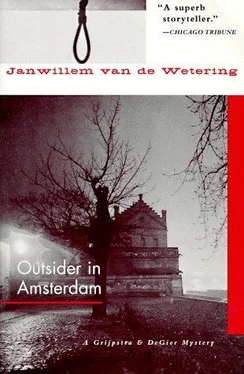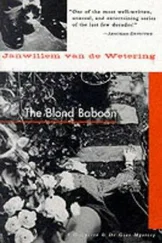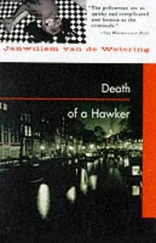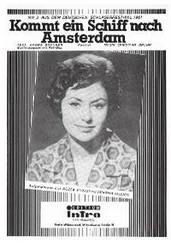Janwillem De Wetering - Outsider in Amsterdam
Здесь есть возможность читать онлайн «Janwillem De Wetering - Outsider in Amsterdam» весь текст электронной книги совершенно бесплатно (целиком полную версию без сокращений). В некоторых случаях можно слушать аудио, скачать через торрент в формате fb2 и присутствует краткое содержание. Жанр: Полицейский детектив, на английском языке. Описание произведения, (предисловие) а так же отзывы посетителей доступны на портале библиотеки ЛибКат.
- Название:Outsider in Amsterdam
- Автор:
- Жанр:
- Год:неизвестен
- ISBN:нет данных
- Рейтинг книги:4 / 5. Голосов: 1
-
Избранное:Добавить в избранное
- Отзывы:
-
Ваша оценка:
- 80
- 1
- 2
- 3
- 4
- 5
Outsider in Amsterdam: краткое содержание, описание и аннотация
Предлагаем к чтению аннотацию, описание, краткое содержание или предисловие (зависит от того, что написал сам автор книги «Outsider in Amsterdam»). Если вы не нашли необходимую информацию о книге — напишите в комментариях, мы постараемся отыскать её.
Outsider in Amsterdam — читать онлайн бесплатно полную книгу (весь текст) целиком
Ниже представлен текст книги, разбитый по страницам. Система сохранения места последней прочитанной страницы, позволяет с удобством читать онлайн бесплатно книгу «Outsider in Amsterdam», без необходимости каждый раз заново искать на чём Вы остановились. Поставьте закладку, и сможете в любой момент перейти на страницу, на которой закончили чтение.
Интервал:
Закладка:
Janwillem Van De Wetering
Outsider in Amsterdam
\\\\\ 1 /////
The Volkswagen was parked on the wide sidewalk of the Haarlemmer Houttuinen, opposite number 5, and it was parked the way it shouldn't be parked.
The adjutant* had switched the engine off.
The adjutant hesitated.
He had arrived at his destination, Haarlemmer Houttuinen, number 5, and the high narrow gable house was waiting for him. He studied the gable house and frowned. The house had a body in it, a dead body, suspended. The body was bound to be turning slowly. Bodies, suspended by the neck, are never quite still.
The adjutant didn't feel like doing anything. He didn't feel like getting out of the car, running through the rain, watching a corpse move slowly, dangling, turning.
"Hey," said sergeant de Gier, who sat next to adjutant Grijpstra.
"Hey what?" asked Grijpstra.
De Gier made a helpless gesture. Grijpstra could explain the gesture, the waving arm with its connected stretched-out hand, as he wanted.
But he still didn't move and adjutant and sergeant listened, peacefully and unanimously, to the fat raindrops that pattered from the heavy juicy spring sky onto the tin roof of the Volkswagen.
"Yes," the adjutant said, and got out of the car. De Gier had parked the car on the edge of the sidewalk and Grijpstra was forced to step into the street, a main thoroughfare, busy at all times of the day and the night. He didn't pay attention and a large American limousine approaching at speed had to turn suddenly to avoid the door of the car. The limousine, suddenly indignant, honked its powerful horn.
De Gier laughed and shook his head. He got out of the car as well, on the safe side, and locked the door carefully while the rain hit him in the neck. In Amsterdam nothing is safe, not even a police car, and mis Volkswagen didn't look like a police car. No expert would recognize the VW as a means of transport reserved for officers of the criminal investigation department. Its radio set was hidden under the dashboard and the antenna was a mere twig, slightly rusty. No one would suspect that the back seat contained a well-oiled carbine, neatly wrapped in canvas, and complete with six magazines, or that the harmless nose of the car was filled with a complete collection of utensils that police officers think they need during the lawful exercise of their duties and including such items as a small suitcase full of burglar's tools, a powerful searchlight, a dredge, gas masks and a tape recorder.
But nothing was suspected and the officers looked as innocent as their vehicle. Grijpstra is a fat man, and de Gier neither thin nor fat, qualities they share with a large number of other men in Holland's capital. Grijpstra wore a badly fitting suit made of expensive English striped material, with a white shirt and a dark blue tie, and de Gier a made-to-order suit of blue denim, a blue shirt and a many-colored scarf neatly folded around his Adam's apple. Grijpstra's hair looked like a well-worn scrubbing brush and de Gier's curls were beautifully cut by a proud and highly trained coiffeur taking an almost personal interest in the glamor of his clients. De Gier's curls were so well shaped, in fact, that he could be mistaken for a woman, if viewed from the rear, and only his narrow hips protected him from attacks from that side.
A pedestrian, in a hurry to reach his parked car, bumped into Grijpstra and hurt himself against the large model service pistol that the adjutant carried under his jacket.
"Watch where you're going," the pedestrian mumbled ferociously.
"Yes sir," said Grijpstra kindly.
An ordinary car was parked on the sidewalk and two ordinary men ran through the rain until they reached the porch of number 5 and tried to catch their breath.
Their object achieved, a new period of inactivity began.
"Bah," Grijpstra said and read the sign on the door.
The sign said HINDIST SOCIETY.
Both men studied it. It looked neat, like the door. The text had been written in an unusual script as if the letter artist had tried to create a mysterious atmosphere. It seemed as if the letters had been drawn very quickly; the result was vaguely Chinese, far away.
De Gier produced a comb and arranged his hair while he looked about him.
The porch was old, and magnificent in its Golden Age splendor. It had been designed in the seventeenth century for a gentleman-merchant who specialized in expensive timber, imported from Africa and the Far East and stored in the first three stories of the tall house, while the merchant himself would have lived in the top three stories from which he could see the harbor and his vast stocks of cheaper timber, stacked in an area of perhaps a square mile. But that was long ago and the stones of the porch were cracked now and the beams supporting the gable house sagged a little. But the well-built house still retained a good deal of its original stately beauty and the present owner had kept it in reasonable repair.
A small window showed a number of objects and de Gier studied them one by one. Glass jars filled with health grains and brown and green tea and a substance that de Gier, after some thought, determined as seaweed. A sign in the window, showing the same sort of lettering as the main sign, informed the visitor that the Society went in for a variety of activities. Grijpsira grunted and read the sign in a loud voice.
"Shop, open from nine to four. Restaurant and bar, restaurant open to nine, bar open to twelve P.M."
He looked at de Gier but de Gier was still studying the display.
There were several small cartons filled with incense and a gilded Buddha statue sitting on a pedestal, staring and smiling, with a headgear tapering off into a sharp point.
"A pointed head," Grijpstra said. "Is that what you get when you meditate?"
"That isn't known as a pointed head," said de Gier, using the voice of his lecture evening, once a month, when he taught the young constables of the emergency squad the art of crime detection.
"Not a pointed head," de Gier repeated, "but a heaven-head. The point points at heaven. Heaven is the goal of meditation. Heaven is thin air. Heaven is upstairs."
"Ah," said Grijpstra. "Are you sure?"
"No," said de Gier.
"You can ring the bell," Grijpstra said. "You have a nice index finger."
De Gier bowed from the hips and rang. His index finger was indeed nice, well tapered, thin and powerful.
Grijpstra, as if he wanted to avoid all comparison, had hidden his hands in his pockets.
The door opened immediately; they had been expected.
Both men braced themselves.
"Suspected suicide," the police radio had said, a few minutes ago. "It seems that a man has hung himself." That was the message, and they had been given the address.
Grijpstra had repeated the address and had said that they would go there, and the female voice belonging to the constable first class of the radio room had thanked them and closed the communication.
And now they had arrived, but they knew no more than the radio had told them.
And now, of course, there would be a great commotion. Several people talking at once. White faces. Fearful eyes. Shouts and screams. Violence affects people.
But the face that looked at them, from the open space where the thick green monumental door had been, wasn't white but black, and it wasn't excited but calm.
The officers studied the man in the door.
"A Negro," Grijpstra thought, "a small Hindist Negro. Now what?"
De Gier hadn't drawn any conclusion. Like Grijpstra he had associated black with "Negro," but he was in doubt. The man was no Negro. "Who else is black?" de Gier thought but the logic line of his thoughts was interrupted by the inquisitive expression on the face of the dark man.
Читать дальшеИнтервал:
Закладка:
Похожие книги на «Outsider in Amsterdam»
Представляем Вашему вниманию похожие книги на «Outsider in Amsterdam» списком для выбора. Мы отобрали схожую по названию и смыслу литературу в надежде предоставить читателям больше вариантов отыскать новые, интересные, ещё непрочитанные произведения.
Обсуждение, отзывы о книге «Outsider in Amsterdam» и просто собственные мнения читателей. Оставьте ваши комментарии, напишите, что Вы думаете о произведении, его смысле или главных героях. Укажите что конкретно понравилось, а что нет, и почему Вы так считаете.












